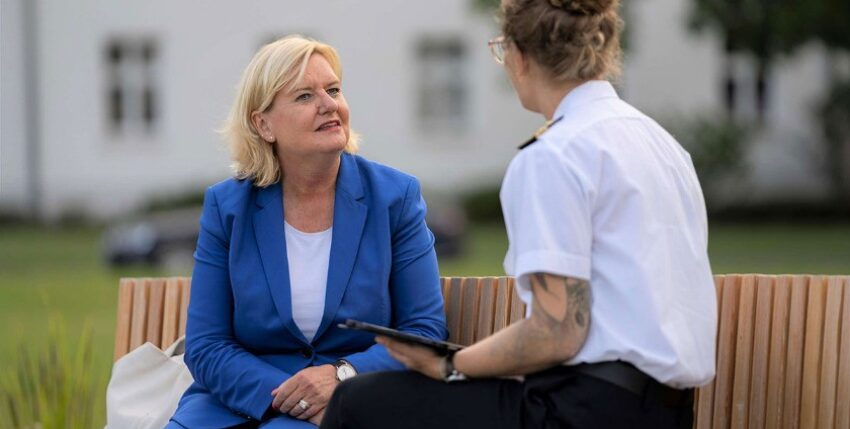From a Bundeswehr press release
On 15 August, Bundestag Parliamentary Commissioner for the Armed Forces Eva Högl visited the naval command in Rostock. Here she held talks with the Inspector of the Navy, Vice Admiral Jan Christian Kaack, as well as with ordinary servicemen and women. She explains to Redaktion Marine how she perceives the special features of the naval forces.
We have several branches of the armed forces in the Bundeswehr, all with their own specialities. But how can the navy deal with challenges such as personnel shortages, demographic change and the expectations of potential applicants?
There are issues in the Bundeswehr that are similar in all branches of the armed forces and organisational areas. And then, of course, there are special conditions in each area.
When I was elected Defence Commissioner over three years ago, my first official appointment was the commissioning of the frigate "Nordrhein-Westfalen" in Wilhelmshaven. I was particularly pleased because I come from Bad Zwischenahn, just a few kilometres away. And my first real visit to the troops was with the naval aviators in Nordholz.
In doing so, I have already included topics that are particularly relevant to the navy. Navigating at sea, providing a credible deterrent at sea and being ready for a possible battle produces issues that are special. And they often cannot be compared with the army, air force or other areas.
What I have realised from the very beginning in the navy is that the servicewomen and men are under a great deal of strain, in some cases overloaded: due to the fact that we have personnel shortages, that the multi-crew concept is a challenge, that the compatibility of family and service is once again very different in the navy than in the other branches of the armed forces. The issue of recruiting personnel is also very different to other parts of the Bundeswehr.
So these are special features that I keep a close eye on when I speak to servicemen and women from the navy. And, of course, I also receive input on specific topics, such as care communication on board. The fact that this is not yet optimal in the navy was one of the first topics I dealt with.
For many of the applicants we have, seafaring is always a bit of a deterrent. How can we deal with this? Do we approach people via monetary approaches? Or is it enough to say: It's already really good with us?
So basically, it is crucial for personnel recruitment, but also for personnel retention, that we have good framework conditions. In the Bundeswehr as a whole, but especially in the navy.
We can make great adverts, YouTube videos and posters that portray the Bundeswehr as attractive - that's how it should be, and that's all well and good. But if the reality on the boats, ships or in the barracks doesn't match this or the difference is too great, then we have a problem.
In my discussions here at the naval command, I have also reiterated and emphasised something: the best advertisers for the navy are the navy sailors themselves. When they talk with conviction about their profession as a soldier - including the difficulties and challenges, but also the opportunities and possibilities, or what seafaring is all about - then that is the best advertisement for the Navy of all.
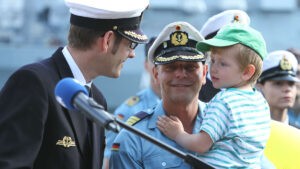
Seafaring is not all fun. Long absences from home are difficult to reconcile with the family. I've already mentioned carer communication on board. Not being able to have any contact with your family over long distances is hard. It's also only attractive to a limited extent.
These are aspects that we have to change and improve step by step. Some things we won't be able to change because travelling by sea will always mean being away from home.
This is also aimed at reconciling family and service for seafarers. We already have the Soldiers' Working Hours Ordinance, the multi-crew model and the principle of being deployed for a maximum of four months per year. What else is needed to improve this?
We need to raise awareness of the fact that a soldier is only fully operational and wholeheartedly on duty if he or she knows that the family is being looked after and that the family is doing well. This applies to service here on the ground as well as at sea, on deployment or during extended absences. And that's why we have to think for the families.
I really like the fact that Inspector Kaack says: "The navy is family." And he means the entire navy as well as the family members.
"Despite everything, I think it's important not to forget the ability to plan"
Reconciling family and service in the navy is no easy task. More flexible working options are needed. During my visit to the naval command, we also talked about teleworking, part-time work and mobile working. This is not possible in every post, but in many more posts than we previously thought. We also realised this during the pandemic.
Despite all the cold-start capability and short-term availability, I think it's important not to forget the ability to plan. The Bundeswehr needs to provide some guidance: What is it all about? When is what due? Who is required?
I see that many people who have special skills are in constant demand during training, exercises and deployments. At some point, they can't do any more and are no longer at home. Despite all our commitment, this no longer has anything to do with being able to plan; we also need space to take a deep breath, time for the family.
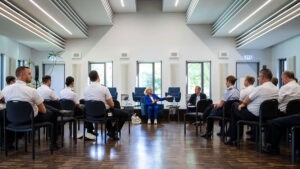
To do this, we need more "personnel reserves" - in the figurative sense. In other words, we really need to recognise that people are on parental leave, that people are working part-time and that our soldiers also have other things to do. We still need to have the personnel resources to buffer this.
The compatibility of family and service is a really important issue, especially the individual career path. We have the so-called "rush hour of life" in which everything happens at the same time: the career in the navy, will I become a professional soldier or not. Then I also look at starting a family at the same time. It all happens at a special time.
And here we need more flexibility, more room for manoeuvre when it comes to assignments. When do officers have to be stationed at the ministry? When do they go on which training courses? We need to take more account of families and individual life situations.
Is parental leave possible without career disadvantages? And can seafaring personnel with a 30-hour week perhaps still go to sea?
It is quite a challenge to reconcile this with the situation we are in - especially with the horrific war in Ukraine, the increased focus on national and alliance defence, the need to be ready for action and cold-start capable in NATO at short notice. Reconciling this with family needs is really no small matter. But it must be possible to take parental leave and still get a good grade in your appraisal. It must be possible to look after children and relatives in need of care and still have a career.
This is not something that lies in the distant future, it is the reality we have now. People want to reconcile and combine these things, and that must also be possible in the armed forces. Once again, this is not possible at every post. It's not possible at all times. Sometimes a deployment or a training project takes priority. Then other things have to take a back seat from time to time, but this must not be the case permanently.

One thing that is very polarising is the hair and beard decree. When will it be adapted, will men and women be treated equally - as in the Dutch navy, for example?
It is unacceptable that the hair and beard decree has still not been revised. I have numerous submissions on this, I often have it as a topic in my discussion rounds and in the annual report. I am absolutely impatient that it is taking so long. It is no longer in keeping with the times to make such distinctions. There are beautiful hairstyles for women and men - with longer hair or shorter hair.
The ministry is working on this and I expect to have a draft on the table soon. Of course, we must always bear in mind that we are talking about male and female soldiers. But making gender distinctions in this way is no longer in keeping with the times.
Based on your opinion from the navy, do you foresee that unmanned systems, such as surface drones and perhaps even artificial intelligence, will be able to reduce the workload and operational burden on naval personnel?
I would absolutely welcome that. We have spoken in the naval command precisely about the fact that the navy also needs more unmanned systems in order to have capabilities at the ready that do not necessarily require a person. A lot is conceivable and a lot is possible.
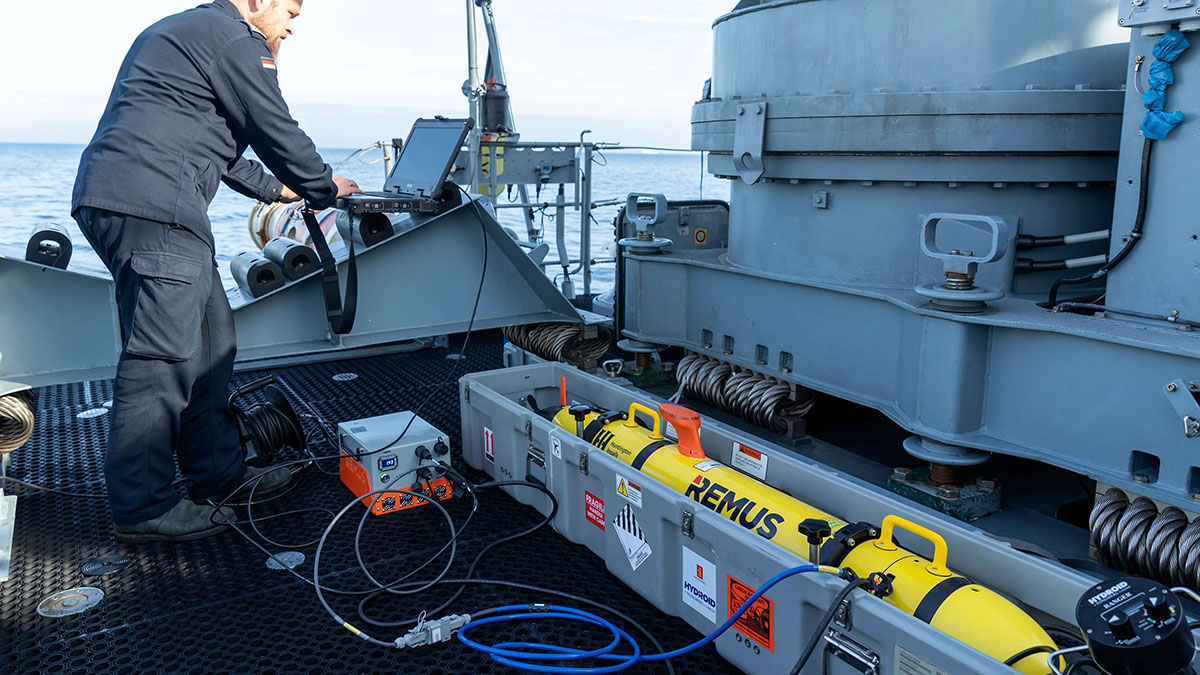
In principle, I am very much in favour of using AIArtificial intelligence and also to utilise unmanned systems. And I very much hope that the special fund will also be used not only to procure state-of-the-art systems and equipment, but also to think about the future.
Above all, I think it would be very good if we also invested a lot in research and development so that we can catch up with those nations that already have this.
"We are completely over-regulated and over-bureaucratised"
Following on from the hair and beard decree, what else can we do to change regulations in a sensible, practical and contemporary way?
We are completely over-regulated and over-bureaucratised. This rightly annoys the soldiers. All regulations should be scrutinised. I believe that we no longer need many things or that we need more regulations with more room for manoeuvre. Or that we can shift many more decisions to lower levels. With a whole lot of trust that the right decisions will be made. This includes a good error culture.
During a visit to the navy, I once learnt that there is an initiative called "Adminimum". Soldiers can use it to let us know if they have noticed something or if they think a regulation is no longer necessary or overly complex. Inspector Kaack told me that he is considering talking to an association about how to streamline regulations. I don't yet know how far this is and I don't want to give too much away. But I think it's great that work is being done on it.

The Marines of the sea battalion still had to borrow skis from the Dutch Corps Mariniers during winter combat training in 2021. This has now been sorted out. However, the "Swiss Army Knife of the German Navy", the naval battalion, in particular, requires a level of versatility that the soldiers are sometimes unable to provide due to a lack of equipment. How can we better equip such specialists?
It is essential that every soldier has everything he or she needs for the respective post and mission. It is scandalous that this is not the case everywhere. Now, of course, we have to make sure that specialised units such as the sea battalion have all the equipment they need for what they have to do. After all, how can they fulfil their mission if they don't have everything? So that has to happen quickly.
The Bundestag has now made 2.4 billion euros available so that personal equipment and equipment can be procured everywhere in the Bundeswehr. And faster than originally planned, namely not by 2031, but by 2025. That is also going well. And I very much hope that this will be accelerated. If I can visit the naval battalion during my term of office and say: They now have everything they need and can fulfil their mission, then I would be delighted.
"2.4 billion euros for personal equipment - that's also going well"
In his intentions for 2023, the naval inspector speaks of the "intact naval family". Members of the naval forces should be given the best possible space to fulfil their potential, but also to question processes. What does that mean for you specifically?
Firstly, I think Admiral Kaack's choice of words is great because it ties in with community and comradeship and at the same time takes family members into account. Secondly, I think it's good to address all individuals. After all, the whole only works if each and every individual does everything they can to make it work. Everyone can make a contribution.
This also means questioning things from time to time and not accepting everything without complaint. This is also inherent in the principle of inner leadership. All individuals are aware of their responsibility and at the same time contribute to driving things forward, changing and improving them. The German Navy is well positioned with this approach.
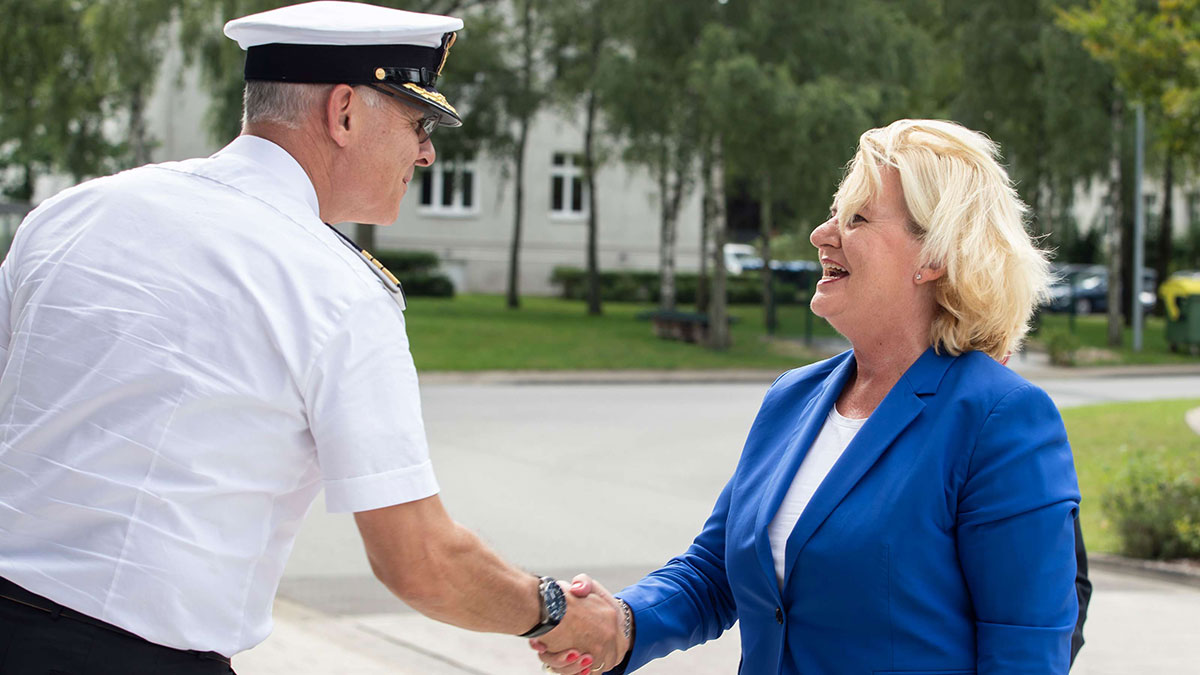
If you met someone outside who asked you, "Why should I join the navy?", what would you tell them?
Seafaring. There are also interesting posts on land, and I have also met soldiers who have said: "Seafaring is not my thing. But I still like being in the navy." But I would still say to anyone who asks me: the navy is seafaring.
Dr Eva Högl has been the Parliamentary Commissioner for the Armed Forces since 25 May 2020. In this role, she supports the German Bundestag in ensuring parliamentary oversight of the armed forces. A central task of her office is to protect the basic rights of soldiers and to ensure that the Bundeswehr complies with the principles of Innere Führung.
Original at: bundeswehr.de

